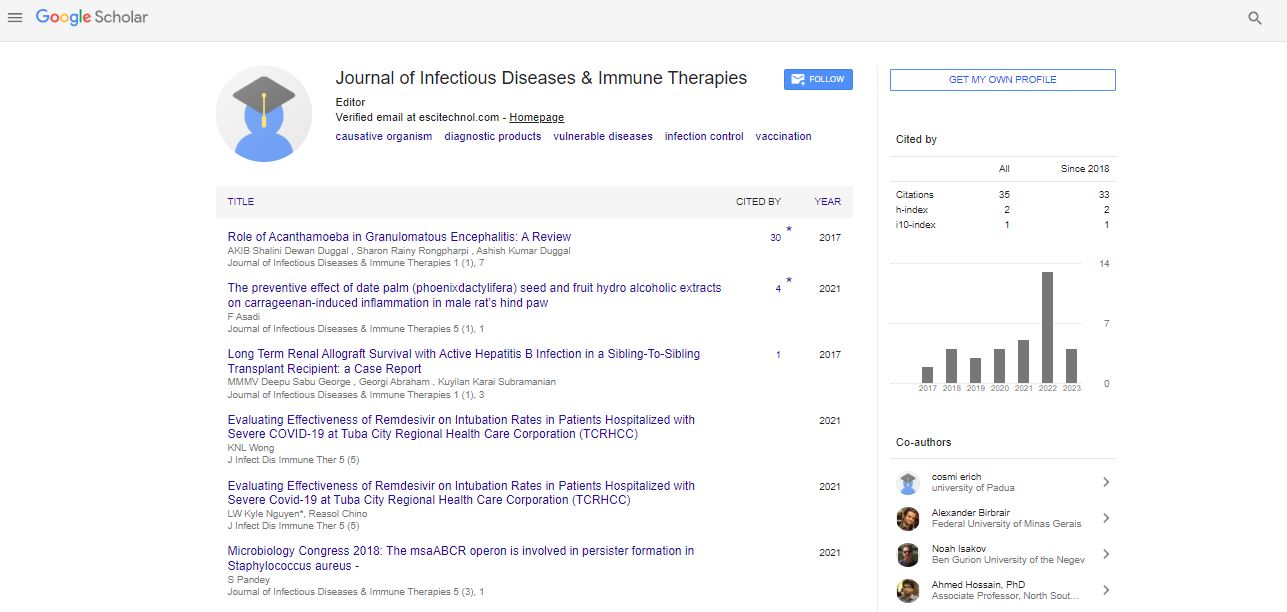Opinion Article, Vol: 12 Issue: 2
Pandemic and Epidemic Diseases: A Comprehensive Overview
Gareth Gruenberg*
Department of Biosciences, University of Oslo, Blindernveien 31, PO Box 1041, 0316 Oslo, Norway
*Corresponding Author: Gareth Gruenberg
Department of Biosciences,
University of Oslo, Blindernveien 31, PO Box 1041, 0316 Oslo, Norway
E-mail: gareth24gruen@ibv.uio.no
Received date: 27 May, 2023, Manuscript No. JIDITH-23-106360;
Editor assigned date: 29 May, 2023, Pre QC No. JIDITH-23-106360 (PQ);
Reviewed date: 15 June, 2023, QC No. JIDITH-23-106360;
Revised date: 23 June, 2023, Manuscript No. JIDITH-23-106360(R);
Published date: 30 June, 2023, DOI: 10.4172/2329-9541.1000347
Citation: Gruenberg G (2023) Pandemic and Epidemic Diseases: A Comprehensive Overview. J Immunol Tech Infect Dis 12:2.
Description
Pandemics and epidemic diseases have shaped human history, leaving indelible imprints on societies, economies, and healthcare systems. This manuscript provides a comprehensive overview of these global health crises, examining their causes, impacts, and the measures taken to combat them. It explores notable pandemics and epidemics throughout history, from the Black Death to the recent COVID-19 pandemic. By understanding the dynamics of these diseases, we can better prepare for and mitigate the effects of future outbreaks.
Pandemics and epidemic diseases have plagued humanity for centuries, causing significant morbidity, mortality, and socioeconomic disruptions. This manuscript aims to shed light on the nature of these global health crises, analyzing their origins, transmission, and impacts on society. By examining historical and contemporary examples, we can gain insights into the strategies employed to control and manage pandemics and epidemics.
To establish a common understanding, it is crucial to define the terms used to describe epidemic and pandemic diseases. An epidemic refers to the occurrence of cases of a disease in excess of what is normally expected within a specific population, whereas a pandemic occurs when an epidemic spreads across multiple countries or continents, affecting a large proportion of the global population. This distinction is essential in assessing the severity and scale of a disease outbreak and informing public health responses.
This section provides an overview of significant pandemics and epidemics throughout history, including the Black Death, Spanish flu, and HIV/AIDS. The Black Death, a devastating outbreak of bubonic plague in the 14th century, claimed millions of lives and reshaped European society. The Spanish flu pandemic of 1918 infected approximately one-third of the world's population and resulted in tens of millions of deaths. The emergence of HIV/AIDS in the 1980s had a profound impact on global health, leading to millions of deaths and prompting extensive research and public health interventions.
Focusing on recent outbreaks, this section delves into the SARS epidemic, Ebola virus disease, and the ongoing COVID-19 pandemic. The Severe Acute Respiratory Syndrome (SARS) outbreak in 2002-2003 highlighted the rapid global spread of infectious diseases in an interconnected world. The Ebola epidemic in West Africa from 2014 to 2016 showcased the challenges of controlling a highly lethal disease with limited resources. The COVID-19 pandemic, which emerged in late 2019, has affected nearly every corner of the world, overwhelming healthcare systems and causing unprecedented social and economic disruptions.
Pandemics and epidemic diseases have profound societal impacts, affecting economies, healthcare systems, and mental well-being. This section explores the economic consequences of these crises, including loss of productivity, disrupted supply chains, and increased healthcare expenditure. It also examines the public health responses employed to control and mitigate the spread of diseases, such as vaccination campaigns, quarantine measures, and public health messaging. The role of international collaborations and organizations in coordinating responses to global health emergencies is also discussed.
Drawing from the lessons learned in managing past outbreaks, this section highlights the importance of preparedness and mitigation strategies for future pandemics and epidemics. It emphasizes the need for robust surveillance systems, early detection and response mechanisms, and investment in healthcare infrastructure. Additionally, the role of research and development in advancing diagnostics, therapeutics, and vaccines is emphasized as a crucial aspect of preparedness.
Pandemics and epidemic diseases continue to pose significant challenges to global health. By studying historical and contemporary outbreaks, we can better understand the nature of these crises and develop strategies to prevent, detect, and control future outbreaks. It is imperative for governments, healthcare systems, and individuals to prioritize preparedness and collaboration to safeguard public health and mitigate the impact of pandemics and epidemics.
 Spanish
Spanish  Chinese
Chinese  Russian
Russian  German
German  French
French  Japanese
Japanese  Portuguese
Portuguese  Hindi
Hindi 